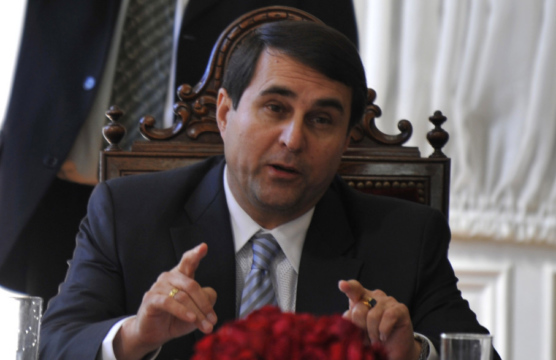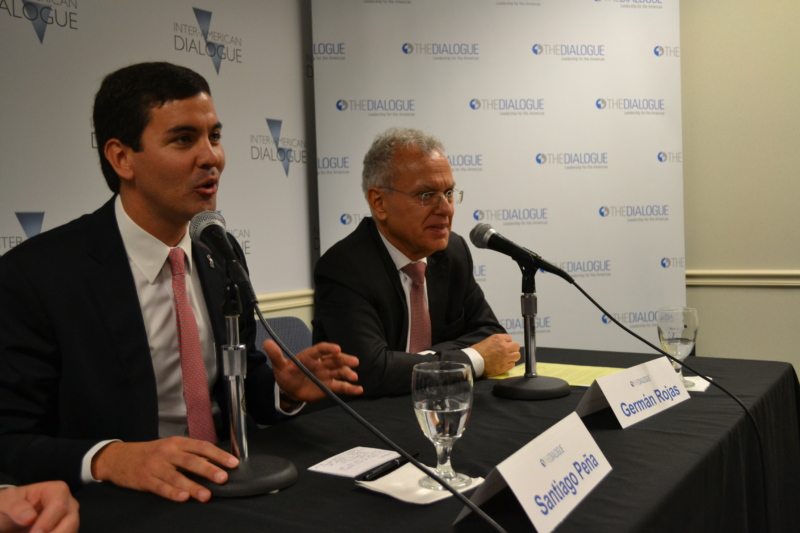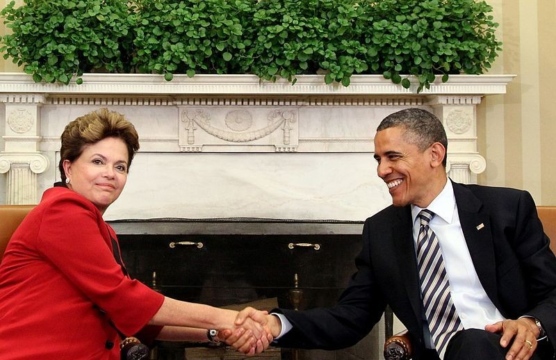
A Conversation with Federico Franco
With no access to the sea and just a fraction of the continent’s economic output, Paraguay will have to play by its neighbors’ rules for the time being.
On April 12th, 2016, the Inter-American Dialogue hosted a discussion on “Paraguay’s Role in a Changing Regional Economy.” The panel consisted of Santiago Peña, Minister of Finance of Paraguay, Carlos Fernández, President of the Central Bank of Paraguay and Germán Rojas, Ambassador of Paraguay to the United States. The event was moderated by Michael Shifter, president of the Inter-American Dialogue.
Peña started his presentation by quoting Augusto Roa Bastos that Paraguay is “an island surrounded by land,” pointing to the irony in the landlocked country being isolated from the region. Discussing the economy, Peña highlighted Paraguay’s success in regard to macro-stability but argued that this should be a base for further dynamism. President Cartes’ administration, according to Peña, has focused its reform agenda on three issues: fiscal stability, public-private partnerships, and the mobilization of resources. Peña discussed the administration’s desire to pass a fiscal responsibility law that would guarantee fiscal health while the government addresses its need for more investment. The government also intends to tackle the issue of violence to strengthen private investment and public-private partnerships. In terms of mobilizing resources, Peña highlighted the need to expand the tax base by incorporating the agricultural sector, which accounts to 20% of overall tax exemption. The minister noted that while Paraguay is affected by external conditions, the country has still seen a reduction in poverty levels and improvements in job creation. Peña concluded that strengthening institutions is the ultimate goal of President Cartes. To this end, the administration seeks to increase accountability in the civil service.
.@santi_penap discusses Horacio Cartes' reform agenda towards macroeconomic stability #DiálogoPY pic.twitter.com/W6jwSMEsUq
— The Dialogue (@The_Dialogue) April 12, 2016
“There are never bad economies during good times,” Fernández said, referencing Paraguay’s relatively strong performance—with a 3% growth rate in 2015—amid a regional economic downturn. He attributed Paraguay’s economic success to macro-stability, as it is “the base for every economy.” Fernández pointed to Paraguay’s currency as evidence of this, highlighting that it has not changed in 70 years. Like Peña, he believes that it is imperative for Paraguay to go beyond this macro-stability, increasing productivity and diversifying the economy in order to adapt to the “new global context.” While diversifying the economy to sustain its success amid neighboring regional crises, the president of the central bank argued that the aim is not to compete with countries like Brazil, but to integrate with them. Recognizing that Paraguay is still in a “bad situation,” he emphasized the need to strengthen institutions through investment in health, education and infrastructure. “Institutions are the key to growth,” he concluded.
"There are no bad economies during good times—bad economies show up during bad times" -Carlos Fernández #DiálogoPY pic.twitter.com/NsmDJVQ62g
— The Dialogue (@The_Dialogue) April 12, 2016
During the round of questions, participants were interested in details about national infrastructure projects, the issue of contraband and fair distribution of the benefits of economic growth, as one pointed to Paraguay’s concerning rate of inequality. Michael Shifter was interested in learning about the perspective of the panelists on the outlook for regional integration.
Addressing the issue of contraband and changing perceptions of Paraguay, Fernández noted that there have been significant improvements apart from the economy: according to Transparency International’s Corruption Perceptions Index, Paraguay saw significant improvements in 2015. “Perception is changing,” he insisted. Peña addressed questions on national infrastructure projects, highlighting the role of private investment that led to Paraguay having the third-largest barge fleet in the world. Peña insisted that, even though Paraguay has been historically isolated, it has become “well-connected.” He concluded that Paraguay is ready to take a leading role in Mercosur, and that there is a need for more trade within the region. Integration has already been a top priority for this administration, according to Peña.
With no access to the sea and just a fraction of the continent’s economic output, Paraguay will have to play by its neighbors’ rules for the time being.
Her visit to Washington approaching, Dilma Rousseff finds herself confronted by diverse challenges.
Mercosur now appears poised to undertake the development of internationally comparable education statistics and indicators for its member countries,
 Ben Raderstorf / Inter-American Dialogue
Ben Raderstorf / Inter-American Dialogue
 Video
Video